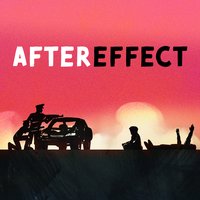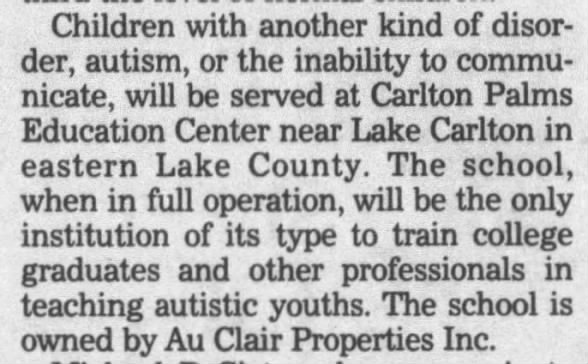https://www.wnycstudios.org/shows/aftereffect
Aftereffect, hosted by Audrey Quinn, has dropped.
ARE YOU LISTENING?
A New Podcast Series Examining How America Fails People with Developmental Disabilities through the Experiences of an Autistic Man Involved in a Police Shooting
What we've learned so far...
As Charles Kinsey lay bleeding in the street, we hear his shooter (a police officer) say it was a bad shot, the sniper was aiming for the other man. The other man? He meant the autistic Hispanic man playing with his toy truck as he sat on the street, seemingly unaware, locked out by his disability? Was he a threat? This is where Audrey Quinn's story begins.
It was a steamy summer of black lives verses blue lives. Amidst national outrage on both sides of the debate, completely unaware of the color war, Arnaldo Rios Soto left his North Miami group home. He wandered down the street and sat in the road with his toy truck. His caregiver, a black man named Charles Kinsey, went to retrieve him. A motorist mistook Arnaldo's toy for gun and called 911. Police arrived and ordered Kinsey to lay down with his hand up. He complied while cell phone video shows him both pleading with Arnaldo to do the same and yelling to the officers that he is Arnaldo's caregiver. Kinsey is shot in the leg. The sniper calls it bad shot. Audio of that day reveals that the shooter claimed to have aiming for the other man.
Following the shooting, Arnoldo was subdued, cuffed with his hands behind his back, and put in the back seat of a police cruiser for several hours while police worked the scene. No one noticed that with his hands restrained Arnoldo could not perform any of his calming measures - flapping his hands, playing with a toy. Instead, he screamed...for hours, after questioning he was returned to his group home.
The next day, Arnoldo, having had time to process what happened the previous day, eloped again. He returned to the scene where Kinsey's blood still marked the moment police violence had entered their lives. It was clear that Arnoldo was far more traumatized than anyone had previously assumed, assumptions made because Arnaldo was not conversational.
Unable to contain his grief, Arnaldo acted out. His group home providers sent him for admission to a psychiatric program where he floundered in a system that lacked a proper placement for him. Arnaldo was kept in the psychiatric unit for more than 30 days as the State of Florida searched for a home for him, again. It seems that Arnaldo had been stuck in a revolving cycle of psych placements and group homes. With Kinsey, Arnaldo's family believed he was making progress. However, Kinsey - who did survive his injury - would never return to the caregiving field of work.
Eventually, representatives from Carlton Palms came calling. Arnaldo had a new home, a facility with a history of abuse and neglect. It's Halloween when Quinn first meets Arnaldo. He's dressed as a police officer as are most of housemates. Think about it. Arnaldo had been at the center of a police shooting. He's seen his caregiver injured. He's been cuffed, left in a police car, questioned in a police station, and drawn back to the bloody scene. Did police costumes constitute Aversion therapy? Nah, Carlton Palms just got a good deal on police costumes.
In episode three, Quinn begins to delve into Arnaldo's past. She learns how his mother fought for a diagnosis and access to education for her son. Quinn discovers that Arnaldo has ahistory of being turfed from one setting to another. She's told that the sweet man before her has a past spotted with violent episodes. Quinn's learning that autism is not just a spectrum but that it has two faces. She's also wading into the adult developmental disability service/support system -underfunded, a patchwork cobbled together, an industry consumed by for-profits seeking the highest Medicaid reimbursements they can attain. Here, restraint isn't an option, it's requisite, as countless substantiated complaints about Carlton Palms confirmed.
Of particular takeaway for parents of those who are developmentally disabled, Quinn interviews autistic people. Yes, Echo is not using people first language; Quinn's sources do not see themselves as a person with extra baggage; rather, they see their autism as an inherit part of themselves which they value. The dichotomy is startling when the conversation turns to self-direction, a requirement of facilities that receive funding under state Medicaid Waivers. These intuit autistic adults turn self-direction on its head and is cause for even the best parents to pause and consider the amount of authority they expect their special children to exercise as adults. Lack of communication skills does not negate the individual mandate.
What happens next? What was particularly cruel about the Halloween costume? What is the Baker Act?
It was a steamy summer of black lives verses blue lives. Amidst national outrage on both sides of the debate, completely unaware of the color war, Arnaldo Rios Soto left his North Miami group home. He wandered down the street and sat in the road with his toy truck. His caregiver, a black man named Charles Kinsey, went to retrieve him. A motorist mistook Arnaldo's toy for gun and called 911. Police arrived and ordered Kinsey to lay down with his hand up. He complied while cell phone video shows him both pleading with Arnaldo to do the same and yelling to the officers that he is Arnaldo's caregiver. Kinsey is shot in the leg. The sniper calls it bad shot. Audio of that day reveals that the shooter claimed to have aiming for the other man.
Following the shooting, Arnoldo was subdued, cuffed with his hands behind his back, and put in the back seat of a police cruiser for several hours while police worked the scene. No one noticed that with his hands restrained Arnoldo could not perform any of his calming measures - flapping his hands, playing with a toy. Instead, he screamed...for hours, after questioning he was returned to his group home.
The next day, Arnoldo, having had time to process what happened the previous day, eloped again. He returned to the scene where Kinsey's blood still marked the moment police violence had entered their lives. It was clear that Arnoldo was far more traumatized than anyone had previously assumed, assumptions made because Arnaldo was not conversational.
Unable to contain his grief, Arnaldo acted out. His group home providers sent him for admission to a psychiatric program where he floundered in a system that lacked a proper placement for him. Arnaldo was kept in the psychiatric unit for more than 30 days as the State of Florida searched for a home for him, again. It seems that Arnaldo had been stuck in a revolving cycle of psych placements and group homes. With Kinsey, Arnaldo's family believed he was making progress. However, Kinsey - who did survive his injury - would never return to the caregiving field of work.
Eventually, representatives from Carlton Palms came calling. Arnaldo had a new home, a facility with a history of abuse and neglect. It's Halloween when Quinn first meets Arnaldo. He's dressed as a police officer as are most of housemates. Think about it. Arnaldo had been at the center of a police shooting. He's seen his caregiver injured. He's been cuffed, left in a police car, questioned in a police station, and drawn back to the bloody scene. Did police costumes constitute Aversion therapy? Nah, Carlton Palms just got a good deal on police costumes.
In episode three, Quinn begins to delve into Arnaldo's past. She learns how his mother fought for a diagnosis and access to education for her son. Quinn discovers that Arnaldo has ahistory of being turfed from one setting to another. She's told that the sweet man before her has a past spotted with violent episodes. Quinn's learning that autism is not just a spectrum but that it has two faces. She's also wading into the adult developmental disability service/support system -underfunded, a patchwork cobbled together, an industry consumed by for-profits seeking the highest Medicaid reimbursements they can attain. Here, restraint isn't an option, it's requisite, as countless substantiated complaints about Carlton Palms confirmed.
Of particular takeaway for parents of those who are developmentally disabled, Quinn interviews autistic people. Yes, Echo is not using people first language; Quinn's sources do not see themselves as a person with extra baggage; rather, they see their autism as an inherit part of themselves which they value. The dichotomy is startling when the conversation turns to self-direction, a requirement of facilities that receive funding under state Medicaid Waivers. These intuit autistic adults turn self-direction on its head and is cause for even the best parents to pause and consider the amount of authority they expect their special children to exercise as adults. Lack of communication skills does not negate the individual mandate.
What happens next? What was particularly cruel about the Halloween costume? What is the Baker Act?
Episode Four drops tomorrow!
Live in Florida or Delaware? Then this podcast should be of special interest to you!









